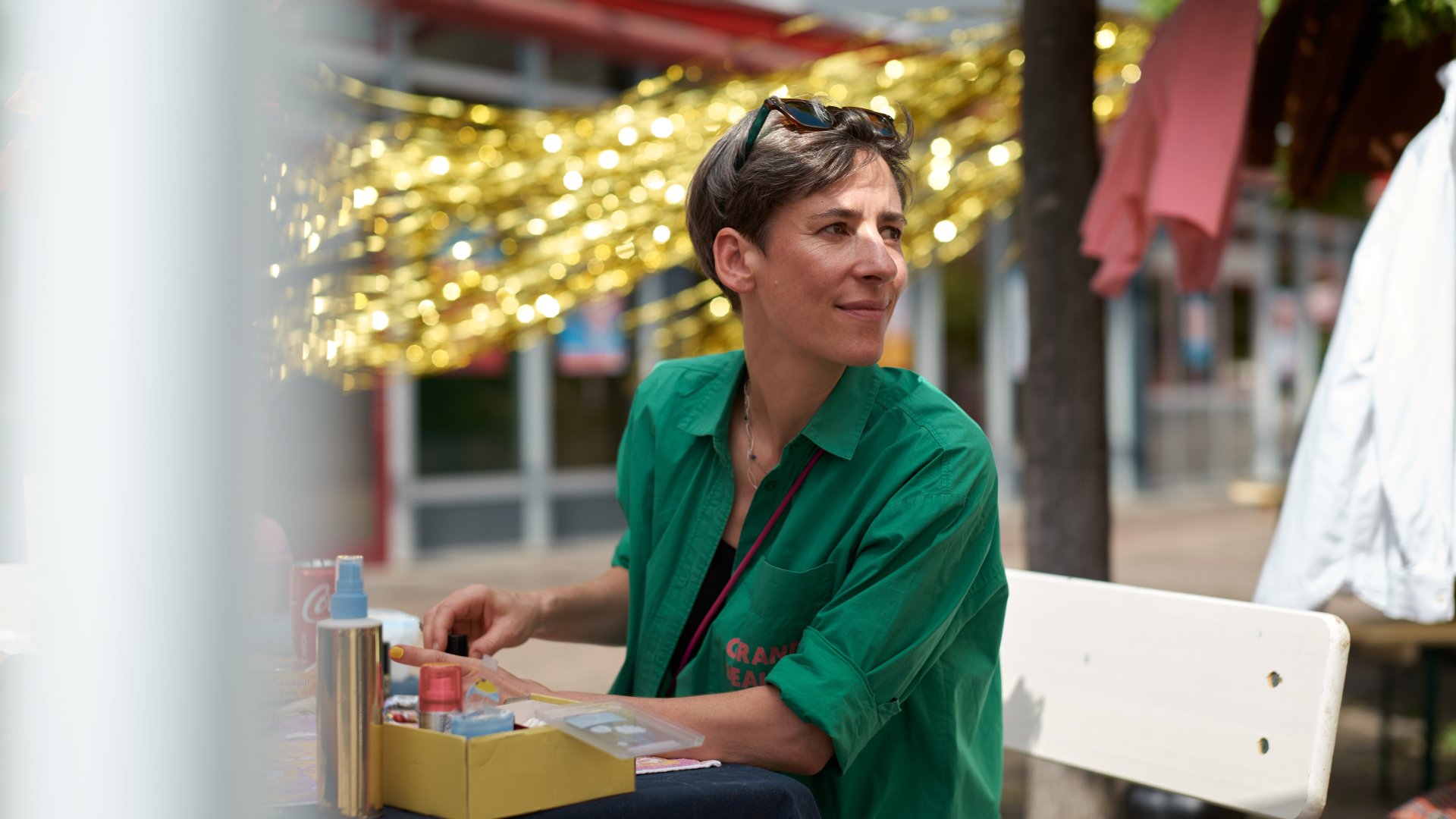“My hope that the state would act ‘outside the box’ has not been fulfilled”
Since 2014, the 'Grand Beauty Salon' has been creating space for encounters between people from diverse backgrounds – whether during a haircut or a beauty treatment. Project leader and artist Frauke Frech believes that open spaces like these are more vital than ever.
We often welcome our guests on the street: friendly, inviting, approachable – that's a great way to start a conversation. Anyone who enters our salon for beauty, diversity, and dialog in the diverse Grünau district of Leipzig should first of all feel at home, have some tea, look around. We then explain who is on the team today, what is possible – haircuts, make-up, massage – and ask them why they have come, what they need, and what they can give in return.
It all began in 2014 in Augsburg – at that time the city with the second-highest immigration rate in Germany. I was living in Grandhotel Cosmopolis, a fusion of refugee accommodation, hotel, and social space. I’d already been exploring the intimate moments of haircutting – the work on the surface that leads to deeper layers. There I met many beauty experts from Iran, Gambia, Afghanistan — with uncertain residence and work status. But in the context of art, we were able to work together – without complicated applications, without language tests. Just getting down to business without bureaucracy, working together.
When Angela Merkel said “We can do it,” I was really inspired. I had the feeling that the state – the German state – was ready to think and act outside the box. But unfortunately, that didn’t happen. Language courses were subsequently cut back, access to the labor market remained complicated, and university degrees were not recognized. To be honest, I have no idea how politicians envision the future in an aging society. I believe that every person has the right to migrate, and I’m committed to that.
We’ve been active in Leipzig for several years. In a district with a high vote share for the far-right party AfD and a high proportion of immigrants, not everyone can afford regular visits to the hairdresser and cosmetic treatments. My colleagues come mainly from Latin America, Ukraine, the Middle East, and Afghanistan. Sometimes a visitor isn’t satisfied with the result of their haircut. But we’re not in the service business, we call it “beauty exchange”. Not only because different expectations and ideals of beauty collide, but because it’s a give-and-take.
“For a long time, we allowed ourselves the luxury of being apolitical. Just be, do, and thereby have an impact. But we’re increasingly asking ourselves whether this positioning is still enough.”
We have regulars and random visitors who just stumble into the shop. Some of our visitors bring cake, others help with translation or repair the sofa. We don't always discuss big questions; it's more about experiencing positive togetherness. There’s enough negativity in the world.
Beauty, as I notice in our work every day, touches on many aspects of life: it's about self-care, freedom, appreciation, education... And those who change images of beauty change social norms. Together with the Robert Bosch Stiftung, we recently developed a workbook that allows others to learn from our work, replicate it, and adapt it. I’d be very happy if the idea spread further in our society.
‘We can do this!’ – What remains of Angela Merkel’s famous words?
Overview with all the statementsThese reflections by Frauke Frech are part of a series within our funding topic immigration society. In 2015, Angela Merkel famously said, “We can do this!” — referring to Germany’s response to the arrival of hundreds of thousands of refugees within just a few months. Ten years on, we have asked experts and partners from our projects: What progress has Germany made in terms of integration?
Most of our employees are women and non-binary people. Fortunately, we’ve not experienced any assaults so far. What we do experience, however, is that our colleagues are reduced to their migration status and face everyday racism.
We can clearly feel the vibe shift in recent years. Funding is drying up. We ourselves are fortunate to have established funding partnerships, including with the state of Saxony. But I see how crucial it would be to secure existing structures in the long term. Otherwise, a dangerous amount will be lost.
For a long time, we allowed ourselves the luxury of being apolitical. A bit like a Trojan horse: just be, do, and thereby have an impact. But we’re increasingly asking ourselves whether this positioning is still enough. Perhaps we need to be more explicit – and we’re discussing this in the team. Because the truth is that the more people in Germany feel neglected and view each other with suspicion, the more we need open spaces and positive encounters. And these can also come about while cutting hair.
Insights into the Grand Beauty Salon
To the video reportLearn more about the Grand Beauty Salon in a video report by the TV broadcaster arte.

